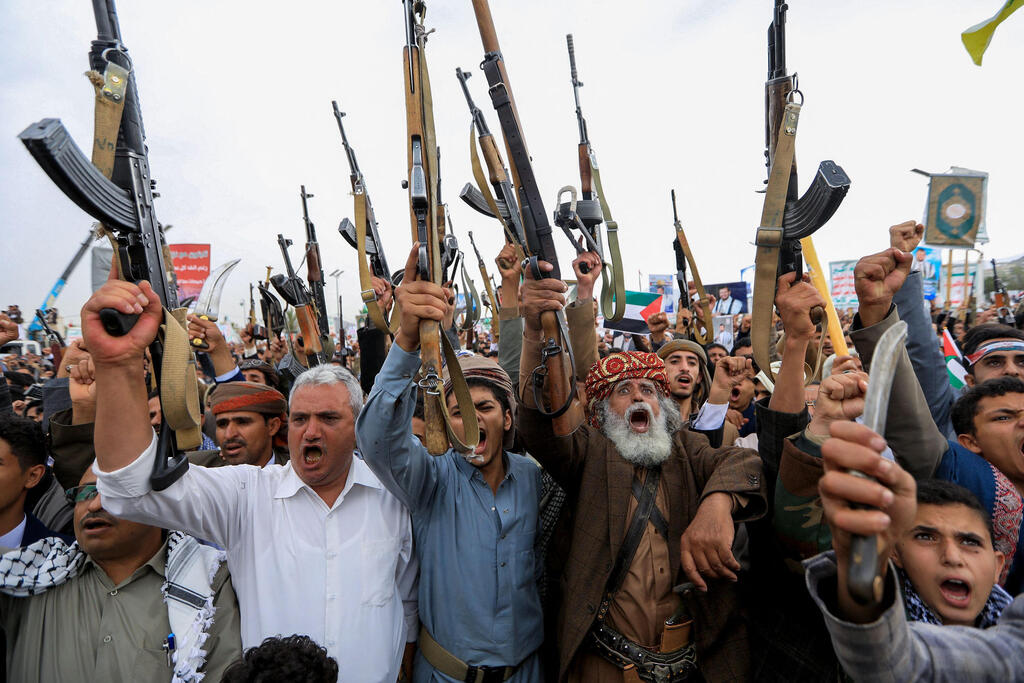Getting your Trinity Audio player ready...
The overthrow of the Assad regime in Syria and the weakening of the Iranian-Shiite axis raise concerns for the Houthis in Yemen. There are already those who do not rule out the possibility that Sanaa will be liberated from the Houthis just as Damascus was liberated from Bashar Assad. "It is a matter of time before the Houthis will face the anger of the people over their injustices," Yemeni political commentator Mahmoud al-Taher told the Saudi newspaper Asharq al-Awsat.
Houthi drone hits Yavne
The Qatari newspaper Al-Araby Al-Jadeed wrote on Tuesday that the consequences of the rapid collapse of the Assad regime are not limited to Syria, and are expected to affect the entire region, especially the Iranian proxies, which include the Houthis.
The resistance axis has been subjected to extensive attacks in Lebanon and Syria in recent months, and Iran has also suffered a blow from Israel. The impact on support for militias loyal to the axis could be decisive.
Yemeni political researcher Adnan Hashem told the Qatari newspaper that the fall of Assad could certainly symbolize the end of the Axis of Resistance, or at least deal a strategic blow that should worry the Houthis and make them reconsider their steps.
"They are part of the axis, and Iran is recalculating," said the political researcher. "Therefore, the question is whether there is an element that is able to benefit from the circumstances."
Iran's intervention in Syria and its protection of the regime then led the Houthis to storm Sanaa
The researcher also noted that the collapsed regime in Syria did not have any significant relations with the Houthis as Assad recently closed the Houthi-run Yemeni embassy in Damascus and asked its employees to leave Syria. At the same time, he was the first to recognize the terrorist organization and gave it military advice.
'The revolution in Syria will lead to the weakness of the Houthis'
Yemeni journalist Salman al-Makrami told Al-Araby Al-Jadeed that the Arab region cannot be separated, especially when it comes to geopolitical changes such as the fall of the Assad regime. According to him, Iran's intervention in Syria and its protection of the regime then led the Houthis to storm Sanaa.
The journalist explained that the fall of the city of Aleppo in 2016 to the Syrian regime and later to other cities in its territory, led to the concentration of efforts by Iran and Hezbollah in the conflict in Yemen and the Houthis' shift from defense to offense. Therefore, he said, "the revolution in Syria will lead to the weakness of the Houthis."
Makrami added that the Houthis' are heavily dependent on Iran, Hezbollah, the Syrian regime, and the Hashd al-Shaabi forces, which unite Shiite militias supported by the Iraqi government. According to him, the loss of these arms makes the Houthis, for the first time since their establishment, dependent on an incompetent ally.
"Until now, the Houthis have not dared to publish a statement of support in which they mentioned the Syrian government. Their media has launched a fierce attack on the Syrian opposition," he explained.
The Saudi newspaper Asharq Al-Awsat reported on Monday that the dramatic events in Syria have awakened the appetite of Houthi opponents who are hoping for a coup in Yemen.
While members of the terrorist organization are fearful of the developments, the opponents have not hidden their joy at Iran's defeat in Syria, and hope that something similar will lead to the restoration of Sanaa. The chairman of the Presidential Leadership Council in Yemen, Rashad al-Alimi, said: "The time has come for the Iranian regime to lift its hand from Yemen, respect its sovereignty and identity, and allow its children to build their country and create the best future that everyone deserves."
The Yemeni people certainly have good reasons to be angry. The images of prisoners seen being released in recent days from prisons in Syria, after decades of being held in harsh and horrific conditions, remind Yemenis of what the Houthis are doing in their country. This terrorist organization also holds political opponents in prisons, carries out indiscriminate arrests, and separates children from their families to take them to terror camps.
Get the Ynetnews app on your smartphone: Google Play: https://bit.ly/4eJ37pE | Apple App Store: https://bit.ly/3ZL7iNv
The Houthis continue to demonstrate their capabilities against Israel. On Monday, they claimed responsibility for launching the drone that exploded in Yavne, and earlier this week they took additional responsibility for "attacking a military target in the south."
Due to the Houthis' support for Hamas since the beginning of the war, Israel has attacked Yemeni territory several times. Now, with the weakening of the Iranian axis, how do the Houthis intend to continue their actions in support of Gaza?








